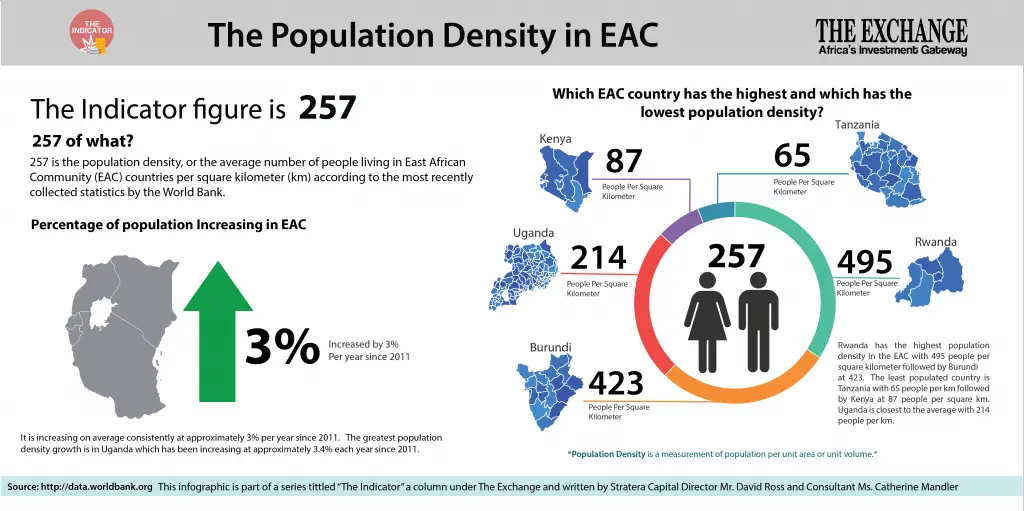This month’s indicator figure is257
257 of what?
257 is the population density, or the average number of people living in East African Community (EAC) countries per square kilometer (km) according to the most recently collected statistics by the World Bank.
Which EAC country has the highest and which has the lowest population density?
Rwanda has the highest population density in the EAC with 495 people per square kilometer followed by Burundi at 423. The least populated country is Tanzania with 65 people per km followed by Kenya at 87 people per square km. Uganda is closest to the average with 214 people per km.
How does the population density in the EAC compare to other regions of the world?
The average population density for the EAC puts it as nearly as populated as the United Kingdom and Pakistan and more populated than Germany, Switzerland, or China. If we look at the most populated countries in the EAC we find that Rwanda is ranked number 20.
Is the population in the EAC increasing or decreasing?
It is increasing on average consistently at approximately 3% per year since 2011. The greatest population density growth is in Uganda which has been increasing at approximately 3.4% each year since 2011.
What impact does increased population density have on the economy of the EAC?
A more densely populated EAC means that the cost for some goods will go up and some will go down. Increased population density tends to increase the costs of real estate, housing, and construction projects as there is more demand for a limited supply of land and multiple floor buildings are required to be affordably
built on higher-priced land. Compared to real estate a higher density of population typically results in a lower cost of transportation and distribution as companies are able to serve a greater number of customers in a smaller area resulting in more effective economies of scale. This lower aggregate cost of transportation and distribution could translate into lower costs throughout the consumer goods and consumables sector.
What investment opportunities are growing with this phenomenon?
In a region where density of population is increasing we would likely see investment growth in construction inputs like cranes and related multi-level construction equipment as well as increased activity in buying and selling of land and other real estate. As more consumers are closer together the consumer goods sector is
likely to take off and locally branded products can grow rapidly in adoption resulting in the potential for significant returns on investment.
How can I learn more?
World Bank Data – Population Density – https://data.worldbank.org/indicator/en.pop.dnst
About the authors:
David L. Ross is the Managing Director at Stratera Capital, Distinguished Professor of Practice at Carnegie Mellon University-Africa, and US Ambassador to the Open University of Tanzania. David is active in growing companies in Eastern and Southern Africa through angel investment, investment advisory, strategic
partnerships, and executive education. Connect on LinkedIn at http://tz.linkedin.com/in/davidlross1 or at
david@strateracapital.com.
Catherine Mandler is a Consultant at Stratera Capital. Connect on LinkedIn at http://www.linkedin.com/in/CatherineMandleror at catherinemandler@strateracapital.com.
